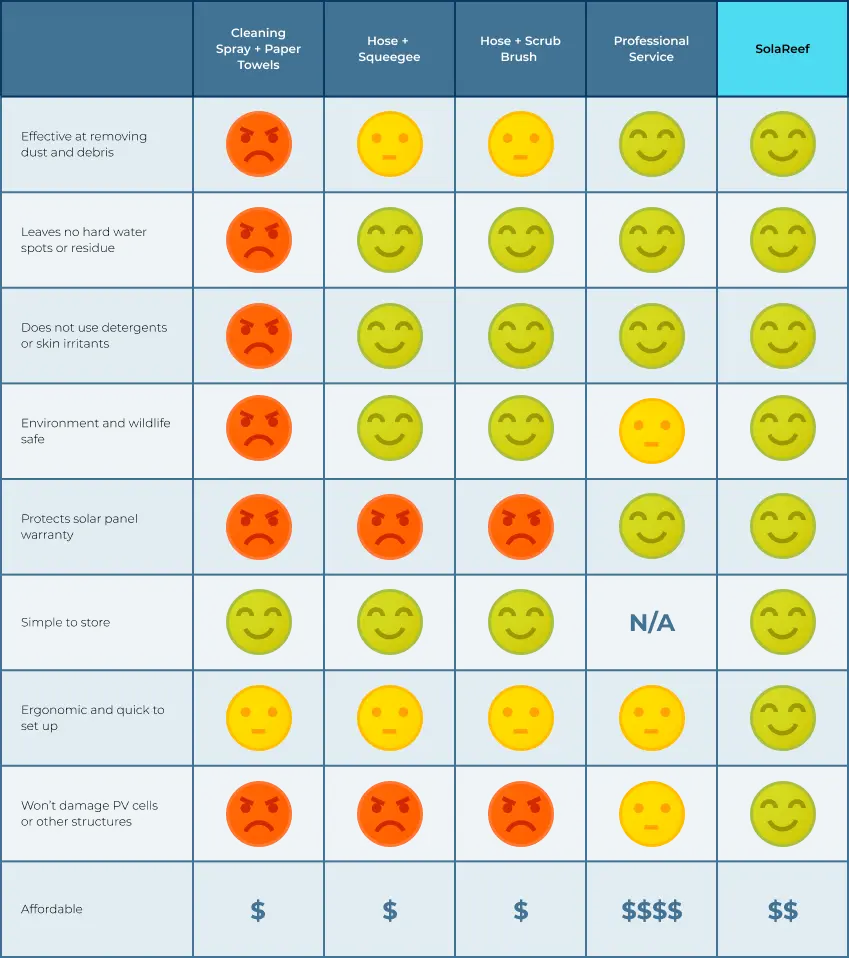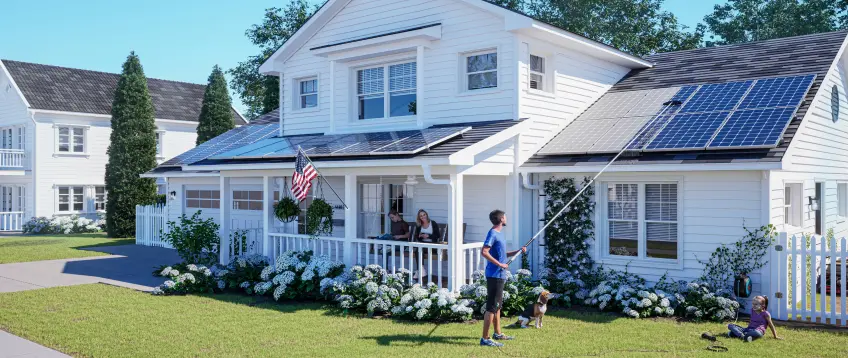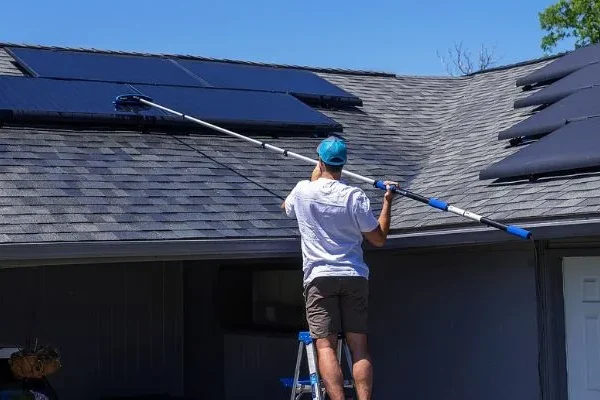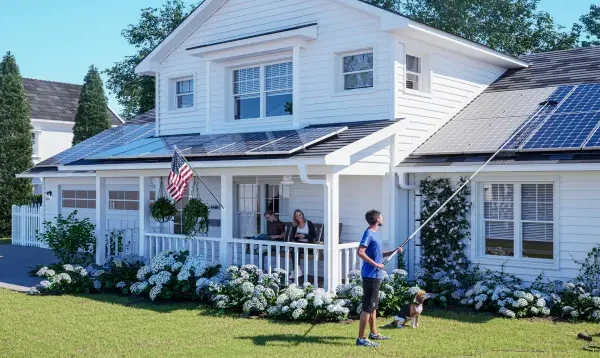What is the best way to clean solar panels?
What is the best way to clean solar panels? When it comes to cleaning your panels (and yes, you need to clean your panels), it’s crucial to understand that what works for other cleaning projects WILL NOT WORK for solar panels. Your favorite sprays, brushes and that rusted squeegee need to stay far away from your panels or you risk damaging them permanently and voiding your warranty.
No matter how many panels you have in your home solar panel system, there are major factors that every solar customer should consider when deciding on the best way to clean solar panels, and we will show you what to look out for.
9 Factors to Consider When Choosing a Solar Panel Cleaning Method
1. Effectiveness at removing dust and debris
Dirty solar panels produce less energy. For the most sunlight absorption and energy production, a clean panel needs to be 100% clean. Any leftover dust can get caked on in layers that become nearly impossible to remove and block light absorption. Long-term, this leads to hotspots and eventual cell failure, or worse, possible system failure.
Are your cleaning tools merely pushing dust around? Or are they really cleaning the surface and allowing the PV cells to absorb the most light?
2. Leaves no hard water spots or residue
There are two main sources of residue or spots on solar panels. One is the water itself that is used to wash the panel. Terrible irony, there. Tap water right out of your home’s main water line will eventually damage the solar panel because it contains heavy metals and salts. Over time, built up mineral ions reduce solar cell performance, create hot spots, and negatively affect your panel’s effectiveness by as much as 30%!
The second source of residue is that which is left by cleaning solvents, soap, or other solutions. The time it takes for water evaporation to occur is just seconds, leaving behind foaming agents, oils, and other unwanted substances on the surface of your panel.
3. Does not use detergents or skin irritants
Do you pat yourself on the back for using only “natural” soaps and cleaners, and think they would be safe to use on your solar panels? What does “natural” mean, anyway? Welp, when it comes to the advertising and marketing of cleaning solutions, it doesn’t mean much. According to the Environmental Protection Agency’s FAQ: “Cleaning products marketed as “natural” typically use chemicals made from corn or other biological sources, rather than petroleum. While these cleaning products may be made out of renewable resources, their “natural” ingredients are still chemically identical to those made from petroleum, so their potential health and environmental impacts during and after use would be the same.”
(https://www.epa.gov/saferchoice/frequently-asked-questions-safer-choice#pane-10)
Can you trust a pro to use a safe method to clean your panels? The jury is out, considering a basic Google search will bring up a variety of “professional” cleaning solutions sold by the gallon. Just because it’s blue doesn’t mean it’s true.
The truth is that the only safe panel cleaning solution out there is deionized water, like the water produced by the SolarWater™ capsules.
4. Environment and wildlife safe
Facts are facts: 13 billion paper towels are used annually in just the United States, adding to an already unmanageable amount of waste in landfills, oceans, rivers and lakes.
As a conscientious consumer invested in solar energy, you don’t make a decision just for your personal well-being; it’s a commitment to the health of our environment and the sustainability of our communities.
Instead of adding to the problem of excess waste, when you clean your solar panels, use a method that is 100% reusable with zero waste per use.
Did you know?
We developed our SolarWater treatment capsules to be long-lasting yet compact in order to minimize waste while providing value. Plus you can recycle your used capsules! We are proud to support sustainability and protect the environment from unnecessary waste and will take your used capsules back when you are ready to purchase new ones. Click here for more information on the capsule exchange program.
5. Protects solar panel warranty
Protecting your solar panel warranty is crucial to ensuring the long-term performance and reliability of your investment.
The most important factor in keeping your warranty intact is regular maintenance, and safe, routine cleaning is number one on the list of maintenance checks. However, accidental damage like scratches or degradation of the anti-reflective coating caused by using unapproved cleaning methods will most likely void your warranty, leaving you financially exposed if a repair is needed.
6. Simple to store at home
Among the cleaning methods we researched, the simplest tools were the easiest to store, for the reason that items such as paper towels, a squeegee, or cleaning spray already have a place for storage under a sink, and a hose is usually already hooked up and ready for use. Using a professional service is even simpler, because they bring their own equipment and take it with them when they go.
The SolaReef Cleaning System can be stored (without being attached to a water supply) much like a broom, hanging on a wall rack or hook with the brush facing the wall to protect the bristles. We like this solution that creates a wall storage solution anywhere in the home or garage.
7. Ergonomic and quick to set up
Whether you are cleaning your panels yourself or hiring an outside team to come to your home, ease-of-use and time definitely matter.
When you hire a guy, you have to book the appointment so that sometime next month, a truck will show up late. The process of positioning the truck just right in your driveway, attaching hoses, accessing your roof, cleaning your panels, then dismantling the whole thing can take hours, while you stand and watch to make sure they don’t knock off roof tiles or take long breaks.
If you are like us and want to DIY, but you’re cleaning your panels using a hose and untreated water, you have to race to dry the panels before they dry covered in spots from the minerals in the water. Aching arms AND spotty panels? No thanks.
SolaReef solves the two important issues of time and ease-of-use. First, you don’t need to hire a guy. You want your panels cleaned today because of some serious dust? Hook SolaReef up and get to it. The extendable pole is ergonomically designed to distribute weight in a way that makes it easy to use even when fully extended. The brush literally does the washing and wiping for you. As for the race to dry before spotting, when you use the deionized water from the SolarWater capsules, there are no minerals to wipe off. In fact, you can leave your panels to dry in the open air, saving you time (and delayed onset muscle soreness).
We are here to
help!
Keep your solar panels sparkling as they soak up the sun with our easy-to-use, all-in-one cleaning system designed for residential use.

8. Won’t damage PV cells or other structures
If you haven’t already figured it out, there are many ways to scratch your panels, specifically the anti-reflective coating, or ARC, that functions to absorb as much sunlight as possible. Squeegees, paper towels, scrubbing brushes that work great at removing soap scum? Not for your panels, please. All of these common cleaning tools are too abrasive, and not designed or recommended for solar panels.
A professional may use a good quality brush. You should definitely ask. But many of the brushes we’ve tested on panels during the development of the SolaReef200™ solar panel brush were still too tough, and didn’t have any built-in protection against dings and dents to the panel system.
‘‘SolaReef’s solar panels are a solid investment. They’re durable, weather-resistant, and consistently deliver impressive energy production. Choose SolaReef for reliability and high performance.
9. Affordable
Many of the cleaning methods listed in this article are cheap and affordable, while others cost more. From the get-go, the goal of cleaning your panels is to maintain them and keep them operating at their max to save you more money, so why risk damaging them in the process? On the other hand, hiring a professional cleaning service ensures a thorough, safe clean with minimal effort on your part. However, this is the most expensive option and might not be necessary unless your panels are particularly dirty or difficult to access.
More expensive upfront than some of the other methods, yet hundreds less than a professional service, theSolaReef system could save you money in the long run by preventing damage to your panels and maintaining their performance.
Comparison
Chart

To check how well different methods clean solar panels, we looked at a few important factors. We focused on how well they clean, how easy they are to use, how much they cost, how safe they are, and their impact on the environment. We tested each method on the same dirty solar panels. We kept an eye on how long it took to clean, how easy it was to use, and if it caused any damage to the panels. We judged how well they cleaned based on how much dirt they removed and how much better the panels performed afterwards. We also compared the cost of each method to see if it was affordable. We looked at any health risks and potential damage to the panels to evaluate safety. Lastly, we considered the environmental impact of each method, including water, detergents, and energy usage.
This method is affordable and convenient, with no special equipment required. However, it may not be the most effective, as stubborn dirt may need a stronger clean. Additionally, the use of paper towels could potentially scratch the panel’s surface, risking damage to the PV cells and even breaching warranty conditions.
A hose and squeegee offer a more thorough clean than spray and paper towels. It’s an inexpensive solution and relatively gentle on the panels. However, it can be time-consuming and physically intensive, particularly for panels installed in hard-to-reach areas. There’s also a risk of scratching the panels if the squeegee isn’t used carefully.
Like the squeegee method, using a hose and scrub brush can be effective at removing stubborn dirt. However, it’s crucial to use a soft brush to avoid scratching the panels. While this method is affordable, it can be labor-intensive and time-consuming, especially for large solar installations.
Hiring a professional cleaning service ensures a thorough, safe clean with minimal effort on your part. These professional cleaners use equipment that is gentle on the panels and environment-friendly. However, this is the most expensive option and might not be necessary unless your panels are particularly dirty or difficult to access.
The best way to clean solar panels is with the SolaReef system. SolaReef offers a gentle, effective clean without the use of harmful chemicals. It’s also designed to be easy to use and store. While it might be more expensive upfront than some of the other methods, it will save you hundreds in the long run by preventing damage to your panels and maintaining their performance.
Why Choose
SolaReef?
- Easy DIY Cleaning: Designed with DIY enthusiasts and solar panel owners in mind, the SolaReef system is user-friendly and provides thorough cleaning without the hassle.
- Gentle on Panels: Our system is specifically designed to be gentle on solar panels, ensuring no damage during the cleaning process, so you can enjoy peace of mind.
- Enhanced Efficiency: By keeping your solar panels clean, SolaReef extends their lifespan and maximizes their efficiency, ultimately saving you money in the long run.
We are here to help!
Keep your solar panels sparkling as they
soak up the sun with our easy-to-use,
all-in-one cleaning system designed for
residential use.




